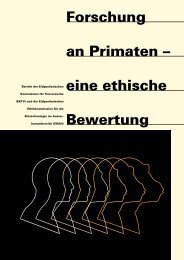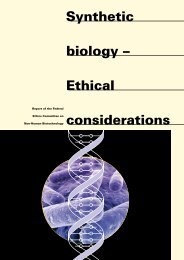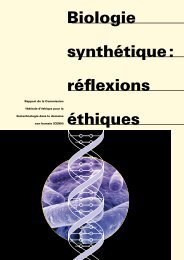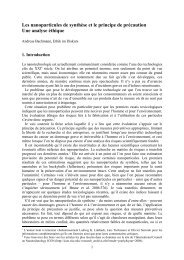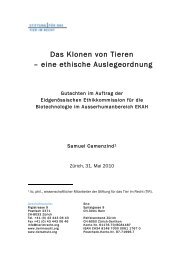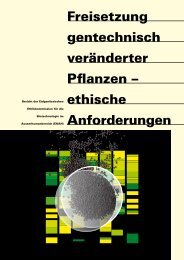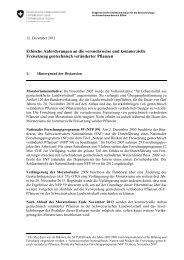Helmut Segner Fish Nociception and pain A biological perspective
Helmut Segner Fish Nociception and pain A ... - EKAH - admin.ch
Helmut Segner Fish Nociception and pain A ... - EKAH - admin.ch
- No tags were found...
You also want an ePaper? Increase the reach of your titles
YUMPU automatically turns print PDFs into web optimized ePapers that Google loves.
Preface<br />
In spring 2010, the Federal Ethics Committee on Non-Human<br />
Bio technology (ECNH; Eidgenössische Ethikkommission für die<br />
Biotechnologie im Ausserhumanbereich, EKAH) commissioned<br />
two studies on <strong>pain</strong> perception <strong>and</strong> consciousness in fish. Both<br />
studies were intended to critically review the recent literature on<br />
cognitive abilities of fish <strong>and</strong> their capability to feel <strong>pain</strong>. These<br />
questions can be approached both from a <strong>biological</strong> <strong>perspective</strong><br />
<strong>and</strong> from a philosophical <strong>perspective</strong>, as the issues of consciousness<br />
<strong>and</strong> cognition are not only a matter of <strong>biological</strong> facts – which<br />
fall within the competence of life sciences – but also a matter of<br />
notions <strong>and</strong> terms, which are within the competence of philosophy.<br />
Therefore, two studies were done in parallel, with one report<br />
written by a biologist (<strong>Helmut</strong> <strong>Segner</strong>), <strong>and</strong> one written by a philosopher<br />
(Markus Wild).<br />
The two reports can be read independently of each other; however,<br />
they are complementary in many aspects. While, for instance,<br />
Markus Wild’s report touches only shortly on the neurological <br />
basis of <strong>pain</strong> perception in man <strong>and</strong> fish, <strong>Helmut</strong> <strong>Segner</strong>’s report<br />
places great emphasis on this aspect. In contrast, while <strong>Segner</strong>’s<br />
report provides little detail on the terminology <strong>and</strong> notion of<br />
conscious ness, Wild presents a systematic <strong>and</strong> in-depth discussion<br />
of this aspect.<br />
We investigated the same topic from different <strong>perspective</strong>s.<br />
Despite our differences in background, methodological approach,<br />
focus, argumentation <strong>and</strong> assessments, we converge <strong>and</strong> agree in<br />
the two major results of our studies: First, we are both convinced<br />
that a new picture of the cognitive capabilities of fish has been<br />
emerging over recent years. <strong>Fish</strong> should no longer be considered<br />
simple-minded, inflexible “reflex machines”, but there is increasing<br />
awareness of their surprisingly complex cognitive competences.<br />
This picture is developing only now, <strong>and</strong> we are still in an early<br />
<strong>Fish</strong>. <strong>Nociception</strong> <strong>and</strong> <strong>pain</strong> | Contributions to Ethics <strong>and</strong> Biotechnology 7



